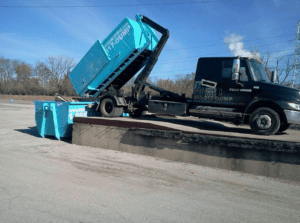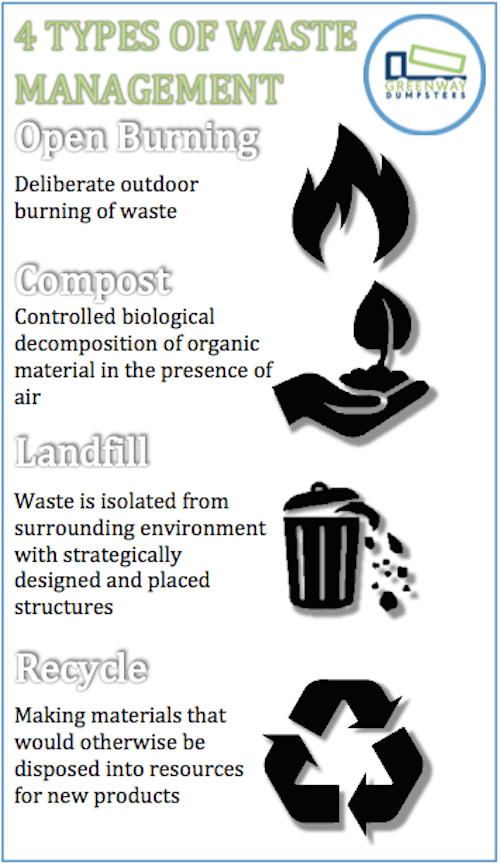Americans, alone, produce 220 million tons of waste every year.

Waste can be categorized into several types, such as liquid, solid, recyclable, etc. In fact, waste is a quite complex thing that many Americans simply do not consider in day-to-day life. Because waste itself is so complex, shouldn’t waste management be somewhat complex too? Shouldn’t we, as responsible Americans and your central Indiana dumpster rental company find the best ways to manage the trash we produce instead of forgetting about it as soon as it hits the trash bin? As your central Indiana dumpster rental company, we get asked questions all the time about where waste goes, and what happens to waste! At Greenway, we are committed to finding the best ways to recycle and properly manage any waste we receive, and have strict regulations to keep the company and customers as safe as possible. Below, we have listed the four most popular methods of waste management:
Open Burning:
Opening burning, like the name implies, occurs when an individuals intentionally burns waste outdoors. This can be done is several opening settings, such as fields or trenches. Unfortunately, open burning is highly restrictive due to the dangers associated with the act, such as the high risk for wildfires or spreading airborne animal diseases.
Essentially, those with experience and always under regulation should only practice open burning. Individuals should only burn their waste if absolutely necessary, and those considering the practice should contact their local and state procedures for particular regulations.
Pros:
– Ideal option for those living in remote areas
– No need for transportation compared to other methods
Cons:
– Highly restrictive and require permission
– Possibility of contamination
– Weather must be appropriate for the process to work
Composting:
Composting, a seemingly more natural route, is a controlled method of biological decomposition that can be practiced on a larger, commercial scale or be practiced by individuals in their backyards.
When practiced on a commercial scale, such as on farms, the process is often completed using mechanical mixers, aerators and ventilators. Composting on the individual level, however, is typically done by placing the compostable material in a shady pile, moistening it every so often, and keeping the pile covered with a tarp.
Pros:
– A great method of recycling
– Environmental benefits
– Cost effective
– Produces a usable product
Cons:
– Requires effort and some dedication
– Must have ideal, warmer weather
– Possible odor or runoff
Landfill:
Most of what is disposed of ends up in a landfill. Landfills are intentionally designed for particular waste streams that each have permits, regulations and licensure for particular types of waste.
Pros:
– The extraction of methane during automatic decomposition for source of energy (also considered a con)
– Diminish litter in non-designated waste areas
– Suitable for several waste streams
Cons:
– The treats of leachates harming nearby ecosystems
– Dust and pollution
– Methane gases can buildup in nearby homes and businesses
– Spread of pathogens
Recycling:
Recycling has become more and more popular as the awareness of the importance of the practice is becoming relevant as landfill capacities are being reached. Much of what we throw away can be recycled. Materials that can be recycled include: metals, paper, cardboard, glass, plastics, batteries, bulbs and electronics. As your central Indiana dumpster rental company, we are dedicated to recycling as much material as we can.Did you know that every year, humans produce enough plastic film to shrink-wrap the state of Texas? (source: WM)
Pros:
– Environmental protection
– Reduces consumption of energy
– Conserves natural resources
– Diminishes pollution
Cons:
– Not always cost efficient
– Products made from recycled materials might not last
Waste Management: The collection, transportation, and disposal of garbage, sewage, and other waste products. Waste management encompasses management of all processes and resources for proper handling of waste materials, from maintenance of waste transport trucks and dumping facilities to compliance with health codes and environmental regulations. (According to Business Dictionary)
Check out our infographic:





